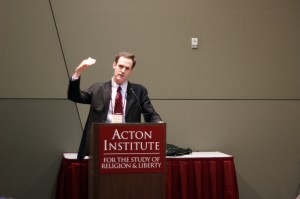
Samuel Gregg’s most recent book For God and Profit continues to receive great reviews. The most recent comes from author and speaker John Horvat, II at The Stream. Horvat begins his review by highlighting the way Gregg reconciles the pursuit of profits with Christianity. He says this:
Early in the book, Gregg establishes that profit through finance can be realized “provided that God comes first and that the profit is (1) understood as a means to an end, (2) never seen as an end in itself, and (3) used to serve rather than diminish, what Christians understand as human flourishing.” If these criteria are met (and that is a big “if” in today’s frenetically intemperate economic climate), then finance is a needed social good.
Gregg’s big “if” is the foundation of his theory of sound Christian economics, which must always be seen in a moral context. Inside this framework, economy would certainly be a lot different and more temperate than it is today. However, it would also be much the same.
Horvat goes on to talk about careers in the finance industry as a calling:
The moral context of true economics elevates the practice of the science above that of a technician. Gregg insists that the banker is not a mere occupation but a vocation, defined as “a summons from the Lord himself.” The banker has a key role to play in a society that seeks to facilitate the practice of virtue and the salvation of souls.Saint Thomas Aquinas believed that “that the very nature of human society meant that different people were destined to fulfill different tasks.”
In conclusion, Horvat shows how Gregg makes the connection between finance, faith and human flourishing:
The importance of Gregg’s work lies in demolishing the false myth that finance and the Faith are incompatible. He shows how the principle fight is not economic, but moral. Everything depends on his big “if” that puts economics in its proper balance and perspective. Once a moral framework is guaranteed, the possibilities that facilitate the practice of virtue in common — human flourishing— are limitless. Under God’s loving providence, men are then free to dream with magnificence.
You can read the full review at The Stream here.

